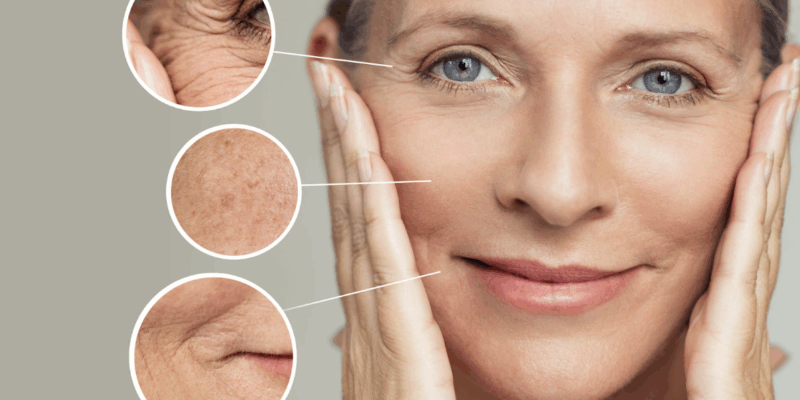The Connection Between Menopause and Skin Changes: What You Need to Know
Posted on 6th October 2025 by Olivia

Did you know that women lose up to 30% of their skin’s collagen within the first five years of menopause? This startling statistic highlights why so many notice sudden changes in their skin, from fine lines and sagging to dryness, sensitivity, and pigmentation. If you’ve looked in the mirror and felt like your skin has aged faster, almost overnight, you’re not imagining it.
Menopause is a natural stage of life, but the hormonal shifts it brings have a profound effect on the skin. The good news is that these changes are manageable. With the right knowledge and personalised skin treatment plan, you can restore hydration, improve firmness, and maintain a radiant complexion well into midlife and beyond.
At Dr Yusra Clinic, we specialise in helping women navigate these transitions with expert-led, science-driven care. This guide explores how menopause affects the skin, what to expect, and the best treatments for menopausal skin to help you age gracefully.
Understanding menopause and its impact on skin health
Menopause typically occurs between the ages of 45 and 55, though skin changes can begin earlier during perimenopause. While menopause marks the end of menstrual cycles, its effects are felt throughout the body, especially in the skin.
- Oestrogen supports collagen, elastin, and hydration.
- Progesterone regulates oil production and skin balance.
- Testosterone remains stable, sometimes contributing to breakouts or facial hair.
When oestrogen and progesterone decline, the result is a thinner, drier, less resilient skin barrier that is more prone to ageing and sensitivity.
Common skin changes during menopause
During menopause, shifting hormone levels can bring about several noticeable changes in the skin, including:
Loss of collagen and elasticity
Collagen levels drop rapidly, leading to sagging, jowls, and deeper wrinkles. Skin loses its plumpness and youthful bounce.
Dryness, dehydration, and sensitivity
With less hyaluronic acid and reduced sebum production, skin becomes drier and more easily irritated by skincare or environmental factors.
Thinning skin and delayed healing
Cell turnover slows down, making skin thinner and more fragile. Cuts or blemishes may take longer to heal.
Increased pigmentation and age spots
Hormonal fluctuations can trigger pigmentation such as melasma, as well as sun-induced age spots that become more noticeable with time.
Breakouts and acne in menopause
Adult acne is common due to relative increases in testosterone. Breakouts often appear around the jawline and chin.
Why do these skin changes happen? The role of hormones
Hormonal fluctuations during menopause play a major role in how the skin changes, mainly through:
Oestrogen decline and collagen loss
Oestrogen plays a key role in stimulating fibroblasts, which produce collagen and elastin. With reduced oestrogen, skin structure weakens.
Testosterone imbalance and oil production
When oestrogen declines, testosterone’s influence increases. This can trigger excess oil, clogged pores, and acne breakouts.
Slower cell turnover and skin ageing
Fewer growth factors and slower cell renewal mean skin becomes dull, less resilient, and more prone to visible ageing.
The best treatments for menopausal skin
At our skin clinics in London, Liverpool and Manchester, every treatment plan begins with a detailed consultation, allowing us to understand your unique skin changes and create a tailored programme. Here are some of the most effective solutions:
Medical-grade skincare
A new stage of life calls for a new skincare routine. Medical grade skincare products are clinically proven to address hormonal changes:
- Retinoids to stimulate collagen.
- Vitamin C to fade pigmentation and brighten skin.
- Peptides to restore hydration.
👉 Learn more about Retinol vs Tretinoin.
Skin boosters and injectables
Injectable hydrators like Profhilo directly replenish lost hyaluronic acid, improving hydration, elasticity, and radiance.
Collagen-stimulating treatments
To rebuild structure and resilience, our skin clinic offers:
- Microneedling – creating controlled injury to stimulate collagen.
- Biostimulators such as Sculptra, JULÄINE™, and Lanluma – gradually restoring lost volume.
- Polynucleotides – regenerative injectables repairing skin tissue and enhancing cellular health.
Laser and light therapies for pigmentation and texture
Advanced technologies target pigmentation, redness, and uneven texture:
- Laser resurfacing stimulates collagen and smooths wrinkles.
- IPL (Intense Pulsed Light) reduces pigmentation and redness.
👉 See our blog on Rosacea and Redness Treatments.
Lifestyle and nutrition for healthy ageing skin
Nutrition rich in antioxidants, hydration, stress management, and consistent sun protection are essential partners to in-clinic treatments.
How to build a personalised skin plan during menopause
Every woman’s menopausal journey is unique. That’s why personalised care is at the heart of what we do at Dr Yusra Clinic. Our consultations take into account:
- Hormonal changes and skin condition.
- Lifestyle and long-term skin goals.
- The right blend of at-home skincare, advanced injectables, and in-clinic technologies.
This ensures sustainable results that prioritise natural, radiant skin.
Conclusion: ageing gracefully through menopause with expert care
Menopause may change your skin, but with modern science and medical expertise, you can maintain confidence in your appearance. From medical-grade skincare to collagen-stimulating treatments and advanced laser therapies, there are safe, effective ways to keep your skin hydrated, firm, and luminous.
If you’re noticing skin changes during menopause, book your consultation at one of our award-winning skin clinics in London, Liverpool or Manchester and take the first step towards restoring your skin’s health and vitality.
FAQs
1. Does menopause cause skin ageing?
Yes. Hormonal decline accelerates collagen loss, dryness, and pigmentation, making skin appear older.
2. What is the best skincare for menopausal skin?
Retinoids, vitamin C, and hyaluronic acid are excellent foundations, combined with sun protection.
3. Can injectables help during menopause?
Yes. Profhilo and biostimulators restore hydration and collagen for natural rejuvenation.
4. How does laser therapy help menopausal skin?
Laser resurfacing and IPL target pigmentation, redness, and fine lines effectively.
5. Are menopausal acne breakouts treatable?
Absolutely. With tailored skincare, hormonal balance, and clinical treatments, breakouts can be controlled.



